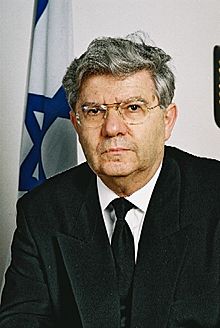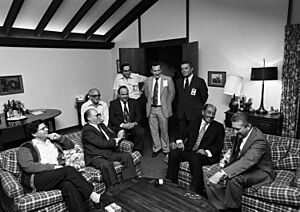Aharon Barak facts for kids
Quick facts for kids
Aharon Barak
|
|
|---|---|
| אהרן ברק | |

Image of AHARON BARAK
|
|
| President of the Supreme Court of Israel | |
| In office 13 August 1995 – 14 September 2006 |
|
| Preceded by | Meir Shamgar |
| Succeeded by | Dorit Beinisch |
| Personal details | |
| Born | 16 September 1936 Kaunas, Lithuania |
| Nationality | Israeli |
| Spouse |
Elisheva Barak-Ussoskin
(m. 1957; |
| Children | 4 |
| Parents | Zvi Brick, Leah Brick |
| Alma mater | Hebrew University of Jerusalem |
| Signature |  |
Aharon Barak (born 16 September 1936) is a famous Israeli lawyer and judge. He was the President of the Supreme Court of Israel from 1995 to 2006. Before that, he was a Justice (judge) on the Supreme Court from 1978 to 1995. Even earlier, he served as the Attorney General of Israel from 1975 to 1978.
Barak was born in Kaunas, Lithuania, in 1936. His birth name was Erik Brick. He survived the Holocaust with his family. In 1947, they moved to Mandatory Palestine, which is now Israel. He studied law, international relations, and economics at the Hebrew University of Jerusalem. He earned his law degree in 1958. From 1958 to 1960, he served in the Israeli military.
From 1974 to 1975, Barak was the head of the law department at the Hebrew University of Jerusalem. Today, he is a law professor at Reichman University in Herzliya. He has also taught at many other universities around the world, like Yale Law School.
Contents
Aharon Barak's Early Life
Erik Brick, who later became Aharon Barak, was born in Kaunas, Lithuania. He was the only son of Zvi Brick, a lawyer, and Leah, a teacher. When the Nazis took over Kaunas in 1941, his family was forced into the Kovno ghetto. Barak shared how a Lithuanian farmer saved his life. The farmer hid him under potatoes and helped him escape the ghetto. This was very dangerous for the farmer.
After the war, Barak and his parents traveled through Hungary, Austria, and Italy. They spent two years in Rome. In 1947, they got papers to move to Mandatory Palestine. After a short time in a small farming community called a moshav, they settled in Jerusalem.
He studied law, international relations, and economics at the Hebrew University of Jerusalem. He finished his law degree in 1958. From 1958 to 1960, he served in the Israeli Defense Forces. He worked in the office of the Financial Advisor to the Chief of Staff. After his military service, he went back to Hebrew University. He finished his advanced law degree (doctorate) in 1963.
At the same time, he started working as an intern at the Attorney General's office. The Attorney General was dealing with the trial of Adolf Eichmann. Since Barak was a Holocaust survivor, he preferred not to be involved. He asked to be moved to the State Attorney's office to finish his internship. After his internship, he became a certified lawyer.
Barak is married to Elisheva Barak-Ussoskin. She was a vice president of the National Labor Court. They have three daughters and one son, all of whom studied law. In 2009, Barak's son-in-law, Ram Landes, made a documentary film about him called The Judge.
Aharon Barak's Academic Career
Between 1966 and 1967, Barak studied at Harvard University. In 1968, he became a professor at the Hebrew University of Jerusalem. In 1974, he was named the head of its law department. In 1975, when he was 38, he received the Israel Prize for his legal research. This is a very important award in Israel. In the same year, he became a member of the Israel Academy of Sciences and Humanities. In 1978, he became a foreign member of the American Academy of Arts and Sciences.
After he retired from the Supreme Court, Barak joined Reichman University in Herzliya. He teaches in the master's degree program for Commercial Law. He also teaches in the regular law degree program. He continues to give lectures at Yale Law School and the University of Alabama in the United States. He also lectures at the University of Toronto Faculty of Law.
Aharon Barak's Judicial Career
Serving as Attorney General
From 1975 to 1978, Barak was the Attorney General of Israel. This role means he was the chief legal advisor to the government. Some of his important decisions during this time included:
- He decided to start a criminal investigation against Asher Yadlin. Yadlin was a high-ranking official. This led to Yadlin being found guilty of taking a bribe.
- He decided to continue a police investigation of Housing Minister Avraham Ofer. Ofer had asked for the investigation to stop.
- He decided to prosecute Leah Rabin, the wife of then-Prime Minister Yitzhak Rabin. This decision led to Prime Minister Rabin resigning. Barak explained that Rabin had already been severely punished by having to resign.

In 1978, Israeli Prime Minister Menachem Begin chose Barak to be a legal advisor. This was for the Israeli team negotiating the Camp David Accords. These were important peace agreements. In his book, Palestine: Peace Not Apartheid, Jimmy Carter praised Barak as a good negotiator.
Serving on the Supreme Court
On 22 September 1978, Barak became a Justice on the Supreme Court of Israel. He was the youngest judge at that time. In 1982–83, he was part of the Kahan Commission. This committee investigated events around the Sabra and Shatila massacre. The committee's findings led to then-Defense Minister Ariel Sharon being removed from his position.
In 1993, Barak became the Deputy President of the Supreme Court. Then, on 13 August 1995, he became the President of the Supreme Court.
During his time on the Supreme Court, Barak greatly expanded the types of cases the court would handle. He changed how the court decided which cases it could hear. This allowed more people to bring their concerns to the court. Professor Daphna Barak-Erez said that Judge Barak significantly changed how the court decided what issues it could deal with. She noted that he believed the old rules limited the court too much. Under his leadership, the Supreme Court became involved in many more areas.
He also set new standards for how the government should act. He also set standards for private businesses. Barak believed that Israel's Basic Laws were like a constitution. He thought these laws gave the courts the power to cancel laws made by the Knesset (Israel's parliament) if they went against human rights. He called this the "Constitutional Revolution."
Barak believed that judges should be active in shaping the law. He thought courts could fill gaps in the law through their decisions. This idea was debated by many, including some politicians. A legal writer, Ze'ev Segal, wrote in 2004 that Barak saw the Supreme Court as a force for change in society. He said the court played a big role in shaping Israeli law, almost as much as the Knesset.
On 14 September 2006, Barak retired from the Supreme Court because he reached the mandatory retirement age. He published his final judgments a few months later. These included important decisions on damages for residents of the Palestinian territories and Israel's policy of targeted killing.
While on the Supreme Court, Barak also led a committee for about twenty years. This committee worked to combine many different civil laws in Israel into one single, comprehensive law.
Important Court Decisions
- Constitutional Revolution: In a case from 1993, Barak and other judges explained the "Constitutional Revolution." This meant that the Supreme Court could cancel laws made by the Knesset if they went against basic human rights laws.
- Tort Law Reform: In a 1983 case, Barak changed important parts of Israeli tort law. Tort law deals with civil wrongs that cause harm to others.
- Property Disputes in Divorce: In a 1995 case, Barak ruled that property disputes in divorce cases should follow Israeli common law, not just religious law. This meant that religious courts had to apply the idea of shared property.
- Contract Interpretation: In a 1993 case, Barak suggested a new way to understand contracts. He said that the situation around how a contract was made should be given a lot of importance.
- Tax Law Interpretation: A 1982 case was a turning point for understanding tax law in Israel. It established that the purpose of a law should be considered, not just its exact words.
- Interpreting Legislation: In a 1980 case, Barak explained his approach to understanding laws. This approach is now widely accepted.
- Duty of Fairness in Companies: In a 1979 case, Barak said that someone who controls a company has a duty to be fair. They cannot sell their shares if it would harm the company or its other owners.
South Africa v. Israel Case
On January 11, 2024, the Israeli government chose Barak to be a special judge. This was for the International Court of Justice case South Africa v. Israel. South Africa had accused Israel of genocide. In this role, Barak voted against some of the temporary orders the court placed on Israel. These orders included preventing acts of genocide and protecting evidence. He suggested there wasn't enough proof for these specific demands.
On June 5, 2024, Barak resigned from this role. He stated it was for personal reasons.
Aharon Barak's Views
Barak strongly supported a court system that actively shapes the law. He believed that Israel's Basic Law acted as its constitution. He used this idea to challenge laws made by the Knesset. Barak's legal thinking starts with the belief that "the world is filled with law." This means that law covers all human actions.
After he retired from the Supreme Court, the new President of the Court, Judge Dorit Beinisch, praised him. She said that Aharon Barak was central to the development of Israeli law. She noted that he opened new ways of thinking.
Amnon Rubinstein wrote about Barak's approach. He said that the Supreme Court could decide on almost any issue. He also noted that the court could overturn government decisions if they were not "reasonable." Rubinstein called this a "total revolution" in legal thinking. He said it made Israel's Supreme Court known as the most active court in the world.
Barak is a secular Jew, meaning he is not strictly religious. However, he believes in finding common ground with religious groups. He also supports government help for religion. His court decisions on religion and state have sometimes caused disagreement with some religious people. Religious Jews held a large protest against the Supreme Court under his leadership. This happened after the court ruled that in divorce cases, religious courts must follow Knesset law for property disputes, not just Jewish religious law.
Awards and Recognition
- In 1975, Barak received the Israel Prize for his work in law.
- In 1987, he became an Honorary Member of the American Academy of Arts and Sciences.
- In 2003, he received honorary degrees from Brandeis University.
- In 2006, he received the Justice Prize from the Peter Gruber Foundation. This was for his courage and dedication to promoting justice.
- In 2007, he received honorary degrees from Columbia University.
Published Works
- Judicial Discretion (1989)
- Purposive Interpretation in Law (2005)
- The Judge in a Democracy (2006)
- Proportionality: Constitutional Rights and Their Limitations (2012)
- Human Dignity: The Constitutional Value and the Constitutional Right (2015)
See also
 In Spanish: Aharon Barak para niños
In Spanish: Aharon Barak para niños
- Dollar Account affair
- List of Israel Prize recipients
 | Kyle Baker |
 | Joseph Yoakum |
 | Laura Wheeler Waring |
 | Henry Ossawa Tanner |

